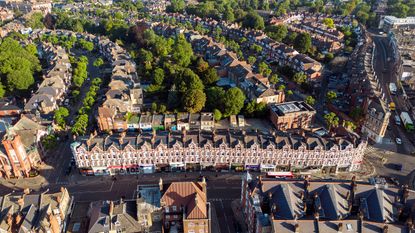UK home sellers cut £14,000 off their asking prices as the buyers’ market returns
The latest house price index from Zoopla shows sellers are accepting a 4.5% discount on asking prices to secure a sale as the property market cools down.


Property buyers are forcing sellers to knock as much as £14,000 off house prices on the market as the UK property market cools.
The latest house price index from online property portal Zoopla shows sellers are having to accept an average discount of 4.5% on asking prices to achieve a sale, the highest in five years, as buyers become more cautious.
As the Bank of England has hiked interest rates, mortgage rates have surged, pricing many buyers out of the market and forcing others to rethink their moving plans and what’s affordable. Indeed, earlier in February, the Royal Institute of Chartered Surveyors reported buyer demand was at its lowest since 2009.
Subscribe to MoneyWeek
Subscribe to MoneyWeek today and get your first six magazine issues absolutely FREE

Sign up to Money Morning
Don't miss the latest investment and personal finances news, market analysis, plus money-saving tips with our free twice-daily newsletter
Don't miss the latest investment and personal finances news, market analysis, plus money-saving tips with our free twice-daily newsletter
According to Zoopla, the average house price increased £42,000 over the pandemic, but some of these gains are now melting away as buyers push for bargains.
Is the buyers’ market returning?
Despite turbulence in the sector, falling house prices could mean it’s now a good time to buy a house.
“Discounts to asking price are larger than in the pre-pandemic years and reflect the rapid transition from a hot sellers' market - where most buyers had to pay the asking price over much of 2021 and 2022 - to a buyers' market,” says Zoopla.
“This transition to a buyers’ market is accompanied by nationwide repricing as the market adjusts to the reduction in buying power thanks to higher mortgage rates impacting buyer affordability.”
Mortgage rates hit a peak of 6.65% after the mini-Budget in September. They have since fallen to around 4% to 5%, and lenders are starting to offer rates below the base rate for the first time since September 2022.
But to put things in context, mortgage rates a year ago averaged 2%. So, even if buyers can lock in a 4% interest rate, they’re still likely to have less purchasing power than they did at the beginning of 2022.
“Many homeowners are sitting on sizable house price gains made over recent years and have more room to be flexible accepting offers below the asking price,” says Richard Donnell, executive director at Zoopla.
“Discounts to asking price have widened and while 4% to 5% discounts are manageable, if these were to widen further then this would point to a greater likelihood of larger house price falls.”
“We’re definitely in a buyers’ market, and we can see clear signs of a slowdown,” says Sarah Coles head of personal finance at Hargreaves Lansdown. “The annual increase in asking prices is now just 5.3% and has been shrinking with each passing month. Buyer demand has fallen by half from last year, and sales volumes are down by a quarter.”
Additionally, the volume of properties for sale has increased by 60% from 2022. “More properties on the books means those buyers who remain are able to drive a harder bargain,” says Coles.
“It means the gap between asking and selling prices isn’t just wider than we saw during the boom years – it’s wider than before the pandemic. We still expect house prices to drop during 2023, and for sales to freeze up. Zoopla says we could get year-on-year falls as early as the summer.”
Where next for the property market?
Zoopla is forecasting a “soft landing” for the property market, expecting house prices to fall 5% this year.
“Property is in the bargain bin, but it’s not necessarily heading for landfill,” says Coles. “It’s worth bearing in mind that we’re not seeing new demand lows – we’re actually still ahead of interest levels in the two years before the pandemic.”
Data from Halifax shows UK house prices rose by 20.4% over the last three years, an increase of £48,620, compared to just 7.8% over the previous three-year period.
At the start of the pandemic property transactions all but ground to a halt. But that was followed by a sharp increase due to a combination of low mortgage rates, stamp duty cuts put in place to support the market, an increase in people’s savings and the “race for space.”
So, while the property market appears to be cooling down, it doesn’t look to be headed for a crash – just a return to average levels of growth.
“Mortgage rates have now dropped back significantly from the peaks in the autumn, and although they are still far more expensive than a year ago, the fact they’re on their way down could help rebuild some of the confidence crushed by surging rates at the end of last year,” says Coles.
“It’s unlikely to be enough to see the return of the sellers' market, but it could help avoid catastrophic house price falls.”
Nic studied for a BA in journalism at Cardiff University, and has an MA in magazine journalism from City University. She joined MoneyWeek in 2019.
-
-
 Investment trust discounts hit 2008 levels. Here’s how to profit
Investment trust discounts hit 2008 levels. Here’s how to profitInvestment trust discounts have risen to levels not seen since 2008, here are three trusts looking to buy to profit.
By Rupert Hargreaves Published
-
 A luxury stock to buy at a high street price
A luxury stock to buy at a high street priceInvestors wrongly consider Watches of Switzerland a high-street outlet.
By Dr Matthew Partridge Published
-
 Investing in wine: how Cru Wine is reaching new audiences
Investing in wine: how Cru Wine is reaching new audiencesTips Gregory Swartberg, founder of fine wine specialist Cru Wine, talks to Chris Carter about how to start a wine collection
By Chris Carter Published
-
 Small companies with big potential
Small companies with big potentialMichael Taylor of Shifting Shares reviews his 2023 picks and highlights more promising minnows.
By Michael Taylor Published
-
 The MoneyWeek portfolio of investment trusts – July 2023 update
The MoneyWeek portfolio of investment trusts – July 2023 updateTips A decade ago we set up the MoneyWeek portfolio of investment trusts. They remain a compelling long-term bet says Rupert Hargreaves
By Rupert Hargreaves Published
-
 Women lead the way with ethical investments
Women lead the way with ethical investmentsDemand for more ethical investments has soared – and women are more likely to opt for them. Annabelle Williams, personal finance specialist at Nutmeg, takes a look at why.
By Annabelle Williams Published
-
 BoE: Mortgage payments to rise by £220 a month for households
BoE: Mortgage payments to rise by £220 a month for householdsMillions of households can expect a mortgage spike of around £200 a month - and some may even reach a extra £1,000 a month, the Bank of England warns
By Marc Shoffman Published
-
 What happened to Thames Water?
What happened to Thames Water?Thames Water, the UK’s biggest water company could go under due to mismanagement and debt. We look into how the company got itself into this position, and what investors should expect.
By Simon Wilson Last updated
-
 Where to invest in the metals that will engineer the energy transition
Where to invest in the metals that will engineer the energy transitionA professional investor tells us where he’d put his money. This week: John Ciampaglia, manager of the Sprott Energy Transition Materials UCITS ETF.
By Nicole García Mérida Published
-
 How investors can profit from high food prices
How investors can profit from high food pricesThe latest furore over grocery prices will die down, says David Stevenson. But the long-term outlook for soft commodities remains bullish. These are the stocks investors can buy to profit from high food prices.
By David J Stevenson Published









